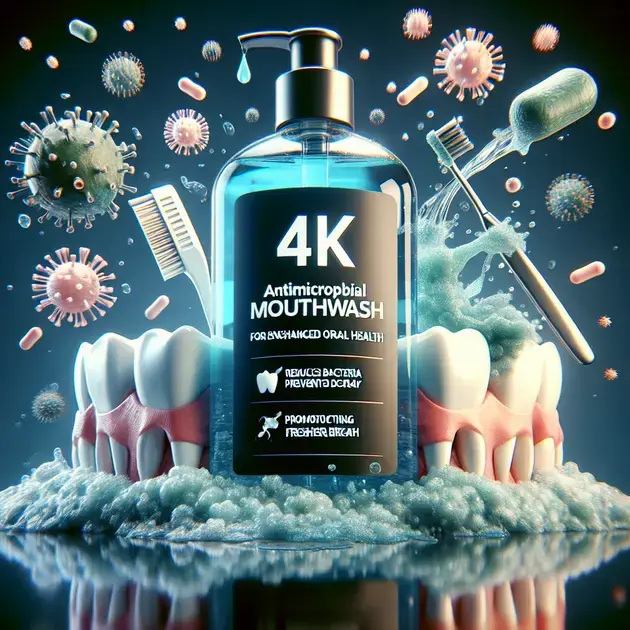Managing Periodontitis: The Role of Medication is a crucial aspect of treating this common dental condition. Periodontitis is a severe form of gum disease that can lead to tooth loss if left untreated. In addition to regular dental care, medication can play a significant role in managing the symptoms and progression of periodontitis.
Recent studies have shown that certain medications, such as antibiotics and antimicrobial mouthwashes, can help reduce inflammation and control the bacterial infection that causes periodontitis. By incorporating medication into the treatment plan, patients can experience improved oral health outcomes and prevent further damage to their gums and teeth.

The Benefits of Incorporating Medication
Medication plays a crucial role in managing various health conditions and diseases. Understanding the benefits of incorporating medication into your treatment plan is essential for ensuring optimal health outcomes. Whether it’s antibiotics for infections or antimicrobial mouthwashes for oral health, medication can significantly improve your overall well-being.
When it comes to antibiotics, they are commonly prescribed to treat bacterial infections. These medications work by either killing the bacteria or inhibiting their growth, helping the body fight off the infection more effectively. It’s important to follow your healthcare provider’s instructions on how to take antibiotics properly to ensure their effectiveness.
One way to enhance oral health is by incorporating antimicrobial mouthwashes into your daily routine. These mouthwashes are designed to kill harmful bacteria in the mouth, reducing the risk of gum disease, bad breath, and other oral health issues. Using an antimicrobial mouthwash as part of your regular oral hygiene routine can help maintain a healthy mouth.
Understanding the Role of Antibiotics in Treatment
Antibiotics are a type of medication used to treat bacterial infections in the body. They are prescribed by healthcare providers based on the specific type of infection and its severity. It’s important to understand that antibiotics are not effective against viral infections like the common cold or flu.
When a healthcare provider prescribes antibiotics, they will provide detailed instructions on how and when to take the medication. It’s crucial to follow these instructions closely to ensure the antibiotics are effective in treating the infection. Failure to complete the full course of antibiotics can lead to antibiotic resistance, making future infections harder to treat.
If you are unsure about how to take antibiotics or have any concerns about potential side effects, don’t hesitate to consult your healthcare provider. They can provide guidance on the proper use of antibiotics and address any questions or issues you may have.
Enhancing Oral Health with Antimicrobial Mouthwashes
Antimicrobial mouthwashes are designed to target and kill harmful bacteria in the mouth, reducing the risk of dental issues such as gum disease and cavities. Incorporating an antimicrobial mouthwash into your daily oral hygiene routine can help improve your overall oral health.
To enhance your oral health with antimicrobial mouthwashes, start by choosing a high-quality product that is clinically proven to be effective. Look for mouthwashes that contain ingredients like chlorhexidine or cetylpyridinium chloride, known for their antimicrobial properties.
When using an antimicrobial mouthwash, follow the instructions on the label for the recommended dosage and frequency of use. Typically, you should rinse with the mouthwash for a specific amount of time before spitting it out. Avoid eating or drinking for at least 30 minutes after using the mouthwash to allow it to work effectively.

Understanding the Role of Antibiotics in Treatment
Antibiotics play a crucial role in the treatment of bacterial infections by targeting and killing harmful bacteria in the body. These medications work by either inhibiting the growth of bacteria or directly killing them. When prescribed by a healthcare professional, antibiotics can effectively combat various infections, from urinary tract infections to respiratory illnesses.
It is essential to follow the prescribed dosage and duration of antibiotic treatment to maximize effectiveness and reduce the risk of antibiotic resistance. Failure to complete a full course of antibiotics can result in the survival of bacteria that may become resistant to the medication, making future infections harder to treat.
While antibiotics are powerful tools in fighting bacterial infections, they are ineffective against viral infections such as the common cold or flu. It is important to differentiate between bacterial and viral infections to ensure that antibiotics are used appropriately and responsibly.
Overuse and misuse of antibiotics can contribute to the rise of antibiotic-resistant bacteria, posing a significant threat to public health. Healthcare providers and patients alike must work together to ensure that antibiotics are used judiciously to preserve their effectiveness for future generations.
Understanding the role of antibiotics in treatment is essential for promoting responsible antibiotic use and combating the growing issue of antibiotic resistance. By following healthcare provider recommendations and staying informed about antibiotic stewardship, individuals can contribute to the global effort to preserve the effectiveness of these crucial medications.
Enhancing Oral Health with Antimicrobial Mouthwashes
Antimicrobial mouthwashes play a key role in maintaining oral health by targeting harmful bacteria in the mouth that can contribute to tooth decay, gum disease, and bad breath. These mouthwashes contain ingredients that help reduce the bacterial load in the oral cavity, promoting a healthier overall environment.
Regular use of antimicrobial mouthwashes can help control plaque and tartar buildup, reducing the risk of developing cavities and gum inflammation. By incorporating mouthwash into a daily oral hygiene routine, individuals can enhance the effectiveness of their dental care regimen and promote long-term oral health.
Antimicrobial mouthwashes are particularly beneficial for individuals with conditions such as gingivitis or periodontal disease, as they can help reduce the levels of harmful bacteria that contribute to these conditions. These mouthwashes can complement professional dental cleanings and at-home oral care practices to help maintain healthy gums and teeth.
When choosing an antimicrobial mouthwash, it is important to select a product that is alcohol-free and carries the ADA Seal of Acceptance to ensure its safety and effectiveness. Additionally, it is recommended to follow the manufacturer’s instructions for use and not to swallow the mouthwash to avoid potential adverse effects.
By incorporating antimicrobial mouthwashes into a comprehensive oral care routine, individuals can optimize their efforts to maintain oral health, prevent dental problems, and enjoy a fresher, healthier mouth overall.
Key Considerations for Using Anti-Inflammatory Drugs
Anti-inflammatory drugs play a vital role in managing pain, inflammation, and swelling associated with various conditions, from arthritis to sports injuries. These medications work by reducing inflammation in the body, which can help alleviate discomfort and improve overall quality of life for individuals experiencing pain.
When considering the use of anti-inflammatory drugs, it is important to consult with a healthcare provider to determine the most appropriate medication and dosage for your specific needs. Different types of anti-inflammatory drugs may have varying effects and potential side effects, so personalized guidance from a medical professional is essential.
It is crucial to follow the prescribed dosage and duration of anti-inflammatory drug treatment to minimize the risk of adverse effects and maximize the benefits of the medication. Abruptly stopping or changing the dosage of anti-inflammatory drugs without medical supervision can lead to complications and negative health outcomes.
Individuals with certain health conditions or taking other medications should inform their healthcare provider before starting anti-inflammatory drugs to avoid potential interactions or complications. Monitoring for any side effects or changes in symptoms while taking these medications is also important for ensuring their safe and effective use.
By carefully considering the key factors involved in using anti-inflammatory drugs, individuals can effectively manage pain and inflammation, improve their quality of life, and work towards achieving better overall health and well-being.
Conclusion
In conclusion, antibiotics, antimicrobial mouthwashes, and anti-inflammatory drugs each play a crucial role in promoting health and well-being through targeted treatments. Antibiotics are powerful tools in combating bacterial infections, emphasizing the importance of completing prescribed courses to prevent resistance. Understanding the distinction between bacterial and viral infections is key to responsible use of antibiotics, safeguarding their efficacy for future generations.
Antimicrobial mouthwashes contribute significantly to oral health by controlling harmful bacteria that lead to dental issues like decay and gum disease. Regular use can aid in preventing cavities and inflammation, enhancing overall dental care efforts. By selecting alcohol-free products endorsed by the ADA, individuals can ensure safety and effectiveness in their oral hygiene routines.
When it comes to managing pain and inflammation, anti-inflammatory drugs offer relief for various conditions like arthritis and sports injuries. Personalized guidance from healthcare providers is essential to determine the appropriate medication and dosage, minimizing risks and maximizing benefits. Vigilance in monitoring for adverse effects while on these medications is crucial for safe and effective usage.



